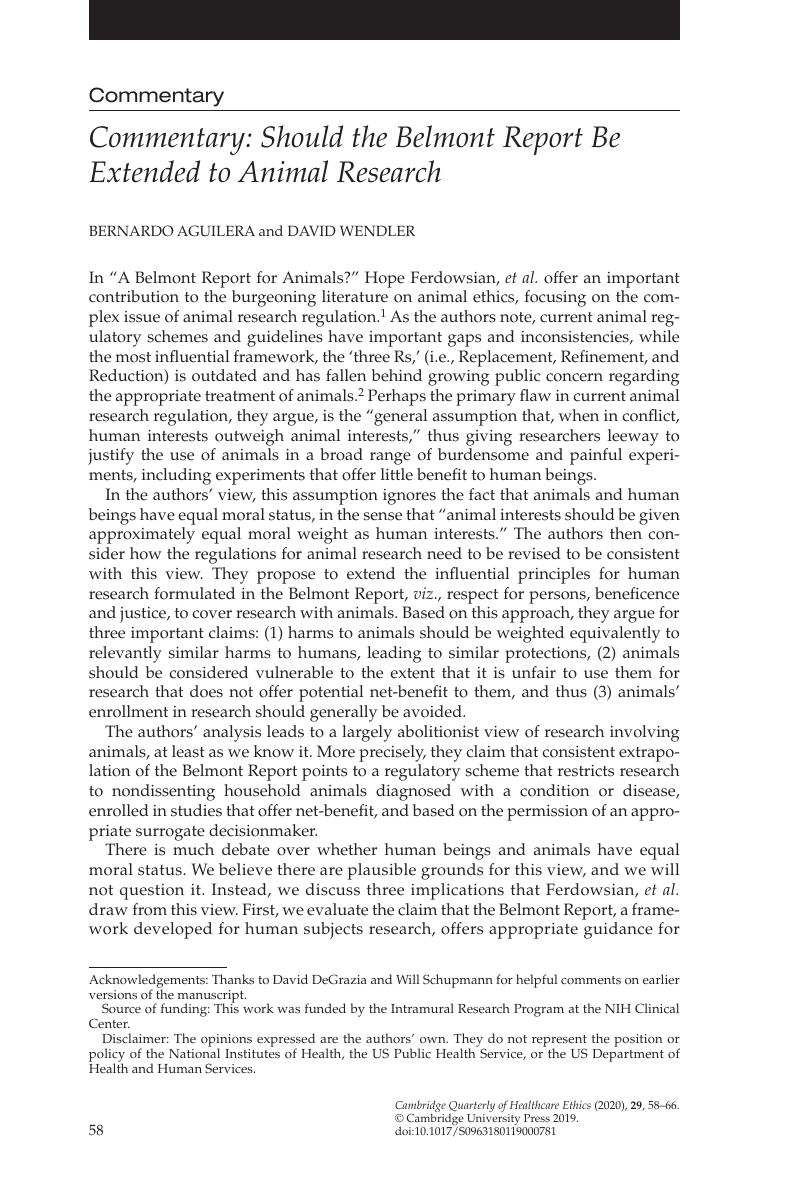No CrossRef data available.
Article contents
Commentary: Should the Belmont Report Be Extended to Animal Research
Published online by Cambridge University Press: 20 December 2019
Abstract

- Type
- Special Section: Open Forum
- Information
- Copyright
- Copyright © Cambridge University Press 2019
Footnotes
Acknowledgements: Thanks to David DeGrazia and Will Schupmann for helpful comments on earlier versions of the manuscript.
Source of funding: This work was funded by the Intramural Research Program at the NIH Clinical Center.
Disclaimer: The opinions expressed are the authors’ own. They do not represent the position or policy of the National Institutes of Health, the US Public Health Service, or the US Department of Health and Human Services.
References
Notes
1. Ferdowsian, H, Johnson, SM, Johnson, J, Fenton, A, Shriver, A, Gluck, J. A Belmont Report for animals? Cambridge Quarterly of Healthcare Ethics 2020;29(1):19–37.CrossRefGoogle Scholar Throughout this paper, we use ‘animals’ to denote non-human animal species.
2. Russell, WMS, Burch, RL. The Principles of Humane Experimental Technique . London: Methuen; 1959.Google Scholar Replacement refers to methods that avoid or replace the use of at least some animals in an area where those animals would otherwise have been used. Reduction refers to any strategy that will result in fewer animals being used. Refinement refers to the modification of procedures to minimize pain and distress.
3. See LaFollette, H. Animal experimentation in biomedical research. In: Beauchamp, TL, Frey, RG, eds. The Oxford Handbook of Animal Ethics. New York: Oxford University Press; 2011:797–825.Google Scholar
4. Beauchamp, TL. The Belmont Report. In: Emanuel, E, Grady, C, Crouch, RA, Lie, R, Miller, FG, Wendler, D, eds. The Oxford Textbook of Clinical Research Ethics. New York: Oxford University Press; 2008:149–55, at 152.Google Scholar
5. Georgetown University. The Archival Collection of the National Commission of the Protection of Human Subjects of Biomedical and Behavioral Research. Box #4, Meeting #15. February, 1976:13–6, at 6.
6. The authors also use the term “impaired,” which denotes the same idea of something that is unable to function according to a relevant standard.
7. Hereafter, we refer to “experiential welfare interests” just as “interests.”
8. DeGrazia, D. Taking Animals Seriously: Mental Life and Moral Status. New York, NY: Cambridge University Press; 1996, at 187.CrossRefGoogle Scholar
9. Some animals may experience considerable harms as a consequence of being captive. Great apes and dolphins, for example, may have the cognitive sophistication to have some of their desires frustrated by otherwise comfortable captivity.
10. Seth, AK, Baars, BJ, Edelman, DB. Criteria for consciousness in humans and other mammals. Consciousness and Cognition 2005;14:119–39. See alsoCrossRefGoogle ScholarPubMed Boly, M, Seth, A, Wilke, M, Ingmundson, P, Baars, B, Laureys, S, Edelman, DB, Tsuchiya, N. Consciousness in humans and non-human animals: Recent advances and future directions. Frontiers in psychology 2013;4:625; andCrossRefGoogle ScholarPubMed Panksepp, J, Lane, RD, Solms, M, Smith, R. Reconciling cognitive and affective neuroscience perspectives on the brain basis of emotional experience. Neuroscience & Biobehavioral Reviews 2017;76:187–215.CrossRefGoogle ScholarPubMed
11. Regan, T. The Case for Animal Rights. Berkeley, CA: University of California Press; 2004.Google Scholar
12. Beauchamp, TL. Rights theory and animal rights. In: Beauchamp, TL, Frey, RG, eds. The Oxford Handbook of Animal Ethics. New York, NY: Oxford University Press; 2011:198–227.CrossRefGoogle Scholar
13. Cavalieri, P. The Animal Question: Why Nonhuman Animals Deserve Human Rights. New York, NY: Oxford University Press; 2001.Google Scholar
14. Cochrane, A. Animal rights and animal experiments: An interest-based approach. Res Publica 2007;13:293–318.CrossRefGoogle Scholar




